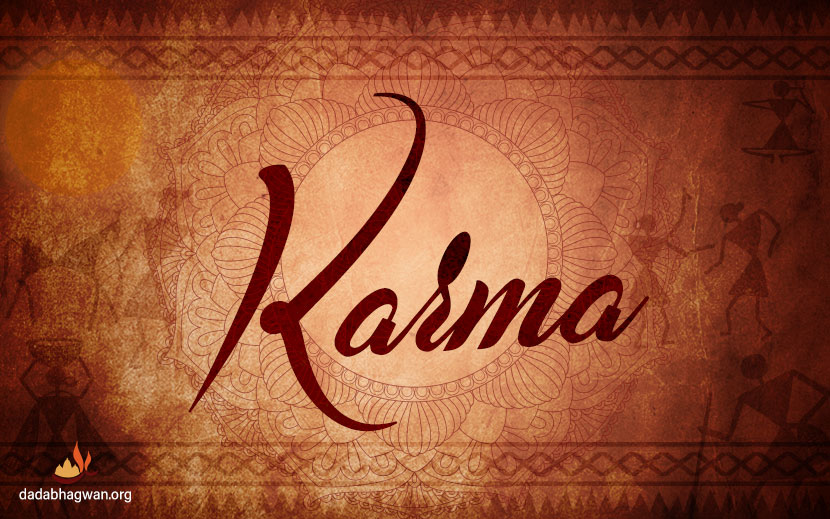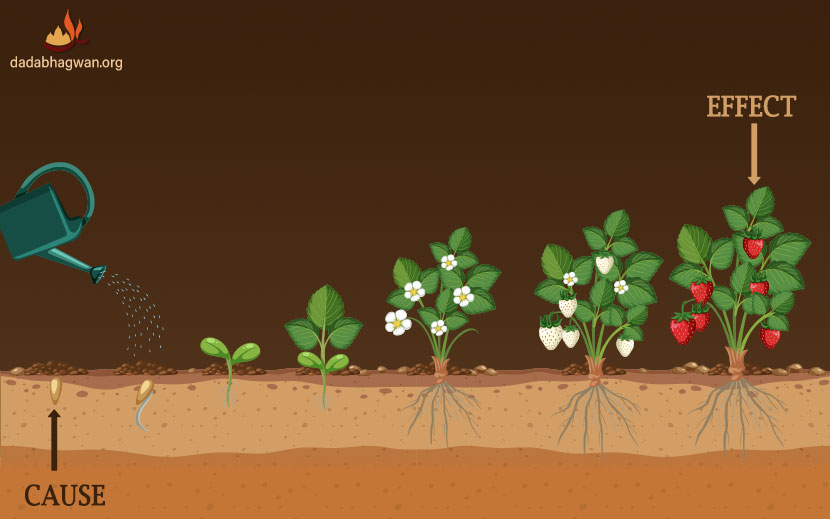What Is Karma: The Wholesome Meaning Revealed Scientifically

Karma means an action for most people. However, this interpretation it is only a part of what karma is. Do you know karma is more than walking, eating, sleeping, working, dancing, playing, thinking, and any other gross action?
Karma is not what most people seem to understand; we recognize karma partially. This partial understanding is perhaps the root cause of different views regarding this term. This is exactly the reason behind multiple karma definitions.
While majority of people believe that karma is nothing but an action, some believe it to be the result of an action. Well, karma is not just an action or its result but is composed of something more. So, what is this something more? Let’s get it straightaway!
Meaning of Karma: From the Scientific Viewpoint
Here is what is karma in simple words:
Karma is an umbrella term that contains a seed (cause) and its fruit (effect). It is a two-stage process.

This understanding about karma is scientific, as one of the interpretations of science is nothing but analyzing and observing the cause and its effect; bringing together certain things (cause) and observing to know what the combination can give (effect).
According to the Indian spiritual scientist of Akram Vignan, Param Pujya Dada Bhagwan, “It is the seed of karma (cause), which gives the fruit of karma (effect) in the next life. People believe that karma is the external activities people do such as eating, sleeping, hitting someone, etc. People label all actions as ‘karma’. But, in reality, the activity they see is really the fruit of karma, not the actual karma itself.”
Let us understand this cause and effect relationship with the help of an example.
Understanding What Is Karma: Analyzing a Common Example in a Scientific Way
Let us assume that there is a father having a 16-year old teenage son. This son goes out daily with his friends to have dinner of delicious junk food in a restaurant.
The father daily tells him not to eat such food, as it will result in bad health or disease such as colitis. The son also agrees that it is not a good habit to eat junk food daily.
However, according to him, he cannot control the moment he passes by such a restaurant; he feels a sudden attraction towards it. He also says that most of his other friends have stopped eating junk food but he is unable to stop himself!

Finally, the son suffers from colitis after five years. After diagnosis, the father tells the son that this is the result or fruit of your bad deed, which was of eating junk food daily.
Observations
- The son ate junk food daily and later suffered from colitis. Due to the result of bad health, for both father and son, eating junk food was bad. In this life itself, the son faced the consequence of eating junk food.
- Although the son did not want to have junk food, he felt an attraction towards it.
Questions in Mind
- Why this attraction happened? After all, no one would get attracted to something without a reason, right?
- While most of his other friends had quit eating this food, he could not. So, what made him to continue eating junk food? What was the reason behind it?
Thus, there is something done by the son before committing this bad deed (action) and suffering its effect (result). It is this something that made the son to commit this deed and suffer later in this life.
Scientific Answer
According to Param Pujya Dada Bhagwan, the reason the son was attracted and could not stop himself from doing so is the seed sown in the past life. He had charged or bound this karma in the previous life by making an intent, for example, “Life is for fun; so, just eat and be merry.” In other words, the actual cause occurred in the past life. This is an essential part to understand when it comes to exploring what is karma.
Analysis with Logical and Scientific Proof
- If the action of eating was the cause, then how attraction arose before the action? After all, a cause is always the starting point; nothing else can precede it, right? If attraction happens first and then the action of eating, it means that the action of eating is not the cause.
- Further, why only the son was attracted to such an extent that he could not stop eating while his other friends could? Thus, the cause of this attraction was laid ahead of attraction and eating.
- If the action would have been the cause, the son could have easily stopped eating, as he then would have the independent power to do so. However, this could not happen.
Conclusion by Proof of Contradiction
Going by the proof of contradiction, the intent is the cause, the action is not!
- The seed sown in the past life is the actual cause; the action of eating junk food is not! Thus, an intent binds or charges karma, not action! An action and its reaction are simply discharge of what was charged (seed/intent).
- It was the intent that gave rise to attraction to junk food in this life, subsequently making the son eat junk food, and then, finally making him sick. Thus, the rise of unstoppable attraction, the action of eating, and the result of falling sick are all fruits of the karma seed (intent).
- All these fruits are visible and occur in the current life itself. However, the cause is invisible and is in the form of intent laid in the previous life. It is the intent that creates or binds karma, not the physical or gross action!
Gaining an Insight
Don’t you feel that intent is nothing but a subtle action that only you can know?
Question in Mind
Is it necessary for the son to have colitis? There are many people who keep eating junk food daily but remain healthy for several years.
Scientific Answer
- No, it is not necessary for the son to have colitis. Yes, there are people who eat junk food regularly but are healthy. To suffer from a disease due to junk food is based on the karmic account. If one has bound such a karma, then only the disease would strike for eating junk food daily.
- People eating junk food daily are bound to suffer when the karma will unfold; this is likely to occur in their next life, if not in this life. If colitis or any other resultant disease strikes in this life itself, it is due to the bound karma that is unfolding in a timely manner to give its fruit.
Gaining an Insight
Right now, whatever you experience with your five senses (external tangible effects) right from birth to death are all effects or fruits of the past life karmas bound (causes).
Key Takeaways
- Each karma is composed of a cause and its effect.
- Cause of a karma, also known as the karma seed, is the intention. It is the cause that determines the journey of the next life.
- Effect or fruit of a karma includes the good or bad action, which can be in the form of behavior, speech, or thoughts, none being stoppable, and the reaction of the action, in the form of the reward or repayment for the action occurred.
Questioner: What is the definition of 'karma'?
Dadashri: Supporting any action, with the claim, "I am doing it," is karma. Claiming doership of any action, binds karma. To support the action with the belief 'I am the doer' is called binding the karma. It is this support of the belief of 'doership' that binds karma. If you know that you are not the doer and are aware of who the true doer is, 'I am not the doer' and 'who is the doer,' then the action will not have any support and the karma will be shed.
When someone praises you, you are pleased, but when he insults you, it upsets you. The external display of emotion is immaterial. The internal intent of these reactions (attachment and abhorrence) is the cause. It is this inner reaction that will bind karma and it is this karma that will be discharged in the next life as an effect. Your whole life is an effect. Bhaav is the inner intent in life. This is the cause. There is a doer of this bhaav. It is called the ‘ego’ (“I am <your name>, and this is happening to me, I am suffering.”).
What Does Karma Mean: From the Spiritual, the Ultimate Viewpoint
To know what is karma from the ultimate viewpoint, watch this video:
subscribe your email for our latest news and events





